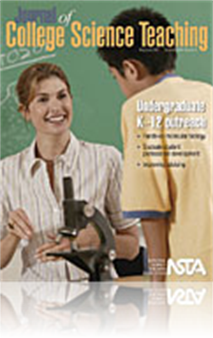All Resources
NSTA Press Book
Genetically Modified Crops: Resources for Environmental Literacy
Supporters of genetic engineering point to the potential of genetically modified (GM) crops to improve human health and increase environmental protection. But some concerned groups argue that the risks of GM crops may outweigh their benefits. These g...
NSTA Press Book
Radioactive Waste: Resources for Environmental Literacy
Since World War II, hundreds of thousands of tons of radioactive materials have been produced in the United States. How we will dispose of nuclear waste is a controversial issue with a large technical component. This book provides a useful resource...
By Environmental Literacy Council, National Science Teachers Association (NSTA)
Journal Article
The Case Study: Using a Case-Study Article to Effectively Introduce Mitosis
Community college students in a nonmajors biology class are introduced to mitosis by reading a case-study article that allows them to gauge how many times various parts of their bodies have been regenerated. The case-study article allows students to ...
Journal Article
Students, faculty, and advisers must have ready access to current, accurate, and useable information about programs and curricula (Commission for Undergraduate Education 1995). College and university publications (e.g., bulletins, catalogs, schedul...
Journal Article
A large enrollment, instructor-centered chemistry course taught with science demonstrations was transformed into one that was more student-centered. Course survey and examination results revealed more positive perceptions of the benefits of demonstra...
Journal Article
According to Carl Sagan (1987), “Science is a way of thinking much more than it is a body of knowledge.” Field studies and undergraduate research provide students with the best opportunities for thinking about science, while at the same time acqu...
Journal Article
Every science major has prerequisites: algebra, calculus, general chemistry, or introductory physics. As faculty, we understand the importance of these foundation courses. After all, we establish these prerequisites or, at least, review their utility...
Journal Article
In this month’s article, the editor discusses her observations regarding the lack of participation from her intellectually mature freshman class. However capable and accomplished they were, these young people didn’t seem to know how to advocate f...
Journal Article
Favorite Demonstration: The Nature of Color Subtraction: A Guided Inquiry Experience
Many college students profess to have an understanding of the nature of color. The study of color begins in the early grades, so it makes sense that students should feel confident regarding their knowledge. However, oral questions to probe understand...
Journal Article
Is Collaborative Grouping an Effective Instructional Strategy?
While problem solving is a generally accepted goal of most science courses, it has previously been difficult to determine the extent to which students’ problem-solving abilities are impacted by these courses. Interactive Multi-Media Exercises (IMME...
Journal Article
A Professional Development Teaching Course for Science Graduate Students
Although the majority of the teaching faculty at U.S. universities is composed of people who are scientific experts, research has found that most scientists do not have information about effective teaching methods (DeHaan 2005). Traditional lecture-s...



